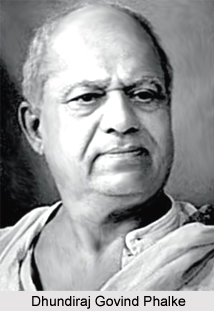 Dhundiraj Govind Phalke affectionately known as Dadasaheb Phalke, is considered as the "Father of Indian Cinema". He made India`s first full-length feature Raja Harishchandra in the year 1913.
Dhundiraj Govind Phalke affectionately known as Dadasaheb Phalke, is considered as the "Father of Indian Cinema". He made India`s first full-length feature Raja Harishchandra in the year 1913.
Dhundiraj Govind Phalke was born in Nasik (Maharashtra) on 30 April 1870. He studied at the Sir J.J. School of Art, Mumbai and the Kala Bhawan at Baroda. He was interested in magic, theatre and painting and these same interests converged in his films and translated into unforgettable sequences. Photography and architecture were added to his skills.
Career of Dadasaheb Phalke
Phalke started his career as a photographer but left the profession after the death of his first wife and child. He then worked with the Archeological Survey of India as a draftsman. He then did specialization in lithography and oleograph and worked for painter Raja Ravi Varma who was the famous painter.
After watching "The Life of Christ" Phalke made his first film, Raja Harishchandra, on May 3, 1913 in Mumbai at Coronation Cinema. Phalke`s first film was 3,700 feet long and played for close to a month. The film was widely acclaimed by one and all and proved to be a great success.
In 1917 for his film Lanka Dahan the Phalke Films made into a partnership concern and renamed Hindustan Film Company. In 1918 the film Shri Krishna Janma was released. It was widely acclaimed. The evil king Kansa dreamt of many Lord Krishna figures attacking him, and cutting off his head. That year, this was the only film showing in Mumbai.
In the year 1919 he made Kaliya Mardan. He also made Sant Tukaram (1921), Setu Bandhan in 1932 and Gangavataran (1937). He made 95 movies and 26 short films in his career spanning 19 years, till 1937, including his most noted works: Mohini Bhasmasur (1913), Satyavan Savitri (1914).
During Phalke`s time, the sound technology was used first in Indian films. Phalke became the victim to this emerging technology. Unable to cope with the talkies, Dada Saheb Phalke became obsolete during his life time. His last silent movie Setubandhan was released in 1932. After that the same film was released with dubbing. During 1936-38, he produced his last film Gangavataran that was released in 1937.
Phalke was offered huge amounts of money to produce his films in England by the British film maker. But he chose to stay in India so that the film industry could develop and flourish.
He set up a studio and trained the technicians, actors to run his film production house (Hindustan Film Company). But he ran into insurmountable problems with his partners. In 1920, Phalke resigned from Hindustan Films, made his first announcement of retirement from Indian cinema. After that he wrote "Rangbhoomi, a widely acclaimed play. Lacking his extremely imaginative genius, Hindustan Films ran into deep financial loss, and he was finally persuaded to return to Nasik. There he died on 16 February 1944.
It was filmmaker Paresh Mokashi and his team that enlightened the movie lovers about Phalke through his first film Harishchandrachi Factory in 2009.
The Dadasaheb Phalke Lifetime Achievement Award is the highest award for the lifetime contribution to Indian cinema. This was instituted in his honour, by the Government of India in 1969. This is the most prestigious and coveted award in Indian cinema.






